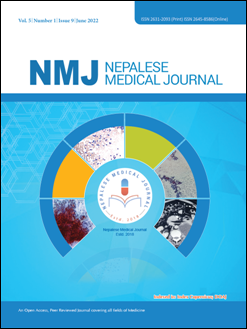Use of Brain Stimulation to Improve Swallowing in a Brainstem Stroke Patient with Cricopharyngeal Spasm: Case Report
DOI:
https://doi.org/10.3126/nmj.v5i1.42251Keywords:
Brain stimulation, cricopharyngeal spasm, Dysphagia, EfficacyAbstract
In India, post-stroke dysphagia affects between 37 and 78 percent of people. In recent years, research into transcranial magnetic stimulation has enhanced our understanding of the neurological aspects of swallowing, thanks in great part to Hamdy and colleagues' pioneering work. TMS has been shown to help with depressive symptoms, anxiety, and parkinsonian symptoms, however, there is no study on how it can help with swallowing. This case study looked at the effects of transcranial magnetic stimulation and transcranial direct current stimulation in combination with standard swallowing training on swallowing function in brainstem stroke patients with cricopharyngeal spasms.
Downloads
Downloads
Published
How to Cite
Issue
Section
License
Copyright (c) 2022 Tanvi Sanghavi

This work is licensed under a Creative Commons Attribution 4.0 International License.
This license enables reusers to distribute, remix, adapt, and build upon the material in any medium or format, so long as attribution is given to the creator. The license allows for commercial use.
Copyright on any article published by Nepalese Medical Journal is retained by the author(s).
Authors grant Nepalese Medical Journal a license to publish the article and identify itself as the original publisher.
Authors also grant any third party the right to use the article freely as long as its integrity is maintained and its original authors, citation details and publisher are identified.




